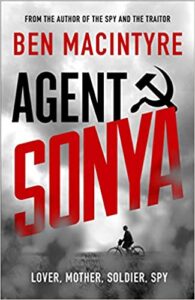Ben Macintyre, Agent Sonya (Viking Books, 2020)
Oxfordshire, England, late 1940s. There is a lady lives in your village; a Women’s Guild type but keeps herself to herself. She loves her children, a doting mother even. She goes for long rides into the countryside on her bicycle, sometimes for hours. No one in the village is quite sure what she does for her money, though she rarely appears short. Then one day, she disappears without a word to anyone. You find out later that the woman in your midst was a spy for the Soviet Union named Ursula Kuczynski. It’s a scenario straight out of a Le Carre novel, but it was true. In Agent Sonya, Ben Macintyre narrates the extraordinary life of this redoubtable spy.
Kuczynski grew up in a middle-class Jewish German family, her father a prominent left-wing economist. This was not the background of a specialist spy, but Kuczynski had an independent streak and came of age during the rise of fascism. She drifted into communism, an ideology she never eschewed despite some severe tests. Kuczynski travelled to the USA, came home and married, then moved to China in 1930 and had a child. She was recruited as a Soviet agent by master-spy Richard Sorge who gave her the codename Sonya. The Soviets trained her as a radio operator then sent her back to China with another man. She had a child by him too, but while she loved her children that did not interfere with Kuczynski’s espionage. She was recalled to Russia in 1935 then transferred to Poland. Her husband stayed behind in China.
Switzerland was Kuczynski’s next stop where she ran agents into Germany. She divorced her first husband and married a fellow agent who was British. Kuczynski came to England in 1943, as Ruth Werner, moving around before settling in Great Rollright in Oxfordshire. As with everywhere else, she set up an illegal radio in her new house and began transmitting to Moscow. She and another spy infiltrated the American OSS, having double-agents sent to Germany. Kuczynski is most famous for handling the atomic spy Klaus Fuchs whose secrets she sent to Moscow, putting them in the atomic bomb race. She was ineptly interviewed twice by MI5, but when they caught Fuchs the game was up for Kuczynski. She fled England for Berlin on the eve of Fuchs’ trial and before he gave her up. She worked in the new GDR and authored several children’s books and her memoir. Kuczynski died in 2000 her communist beliefs intact.
Ben Macintyre should need no introduction; he is surely the leading writer of spy stories in England. With a Macintyre book, you get a fast-paced, tightly-knit story that reads like a novel. Agent Sonya is no different. Macintyre has a telling eye for detail that breathes life into his characters without becoming bogged down in minutiae, and his sense of the dramatic enlivens the text. Do not be lulled, however, into thinking that Macintyre is anything other than a thorough historian who does his research as his endnotes and bibliography attest. As for Ursula Kuczynski, she lived a charmed life, but she also made her own luck through her skill and fortitude. She was cunning, charming, diligent, and disarming; everything you need in a spy. Macintyre captures all of that expertly, and anyone interested in espionage will enjoy this book.
BUY NOW
